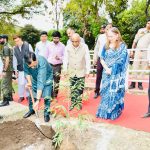Anantnag, April 14: The AICRP‑Pulses Srinagar Centre, in collaboration with the Directorate of Agriculture, Kashmir, organised a one‑day tribal farmers awareness programme at Kapran Qamar, Anantnag, under the Tribal Sub‑Plan (TSP) scheme. The event aimed to familiarise the region’s tribal farming community with the latest advancements in pulse production technologies and sustainable agronomic practices.
Dr Latief Ahmad, in‑charge of TSP, AICRP‑Pulses, SKUAST‑Kashmir, opened the proceedings with an overview of the TSP initiative, emphasising the importance of introducing high‑yielding, disease‑resistant pulse varieties. He urged farmers to diversify their cropping systems—particularly in hilly terrains—to secure both nutritional security and enhanced incomes.
Dr Sher Dar, Senior Pulse Breeder at SKUAST‑Kashmir, presented ongoing research on climate‑resilient pulse varieties tailored to the local agro‑climatic conditions. He outlined best practices such as optimal sowing times, seed treatment, integrated nutrient management and pest control measures to maximise yields.
Speaking on the role of pulses in food and soil health, Dr Ajaz A Lone, Principal Investigator of AICRP‑Pulses, underscored pulses’ capacity for biological nitrogen fixation. He encouraged farmers to integrate pulses into their rotations to improve soil fertility and profitability. The chief guest, Dr Aditya Pratap, Project Coordinator of AICRP‑Kharif Pulses at ICAR‑IIPR, Kanpur, commended SKUAST‑Kashmir and the Directorate of Agriculture for their outreach efforts. He urged farmers to adopt improved varieties and assured them of continued technical support from ICAR institutions.
Sponsored by ICAR‑IIPR Kanpur, the programme distributed quality seed of improved pulse varieties, farm implements, harvesting sheets and technical literature. Over 30 tribal farmers participated, engaging directly with experts to resolve queries and share experiences. The session concluded with a vote of thanks by Nissar Ahmad, Agriculture Extension Officer, Qamar, who reaffirmed the agricultural extension system’s commitment to supporting the tribal farming community.








